八年级英语U5
(完整版)人教版英语八年级上册Unit5动词不定式语法详解
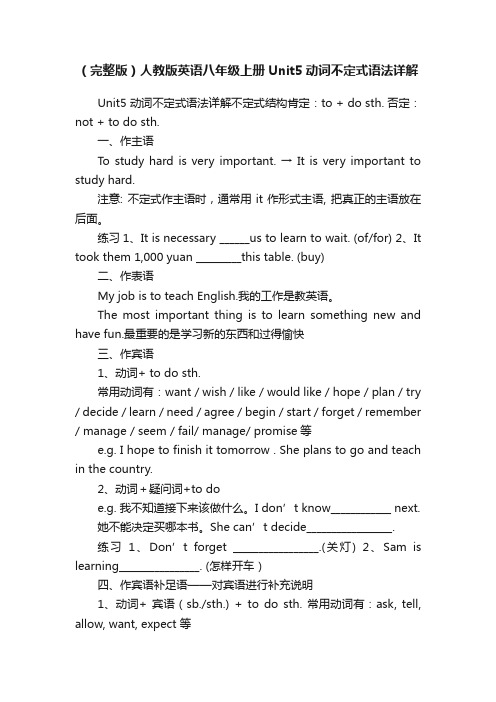
(完整版)人教版英语八年级上册Unit5动词不定式语法详解Unit5 动词不定式语法详解不定式结构肯定:to + do sth. 否定:not + to do sth.一、作主语To study hard is very important. → It is very important to study hard.注意: 不定式作主语时,通常用it作形式主语, 把真正的主语放在后面。
练习1、It is necessary ______us to learn to wait. (of/for) 2、It took them 1,000 yuan _________this table. (buy)二、作表语My job is to teach English.我的工作是教英语。
The most important thing is to learn something new and have fun.最重要的是学习新的东西和过得愉快三、作宾语1、动词+ to do sth.常用动词有:want / wish / like / would like / hope / plan / try / decide / learn / need / agree / begin / start / forget / remember / manage / seem / fail/ manage/ promise等e.g. I hope to finish it tomorrow . She plans to go and teach in the country.2、动词+疑问词+to doe.g. 我不知道接下来该做什么。
I don’t know____________ next.她不能决定买哪本书。
She can’t decide_________________.练习1、Don’t forget _________________.(关灯) 2、Sam is learning________________. (怎样开车)四、作宾语补足语——对宾语进行补充说明1、动词+ 宾语(sb./sth.) + to do sth. 常用动词有:ask, tell, allow, want, expect 等e.g. The teacher asked her to answer the question. The doctor told me to have a good rest.2、动词+宾语+不带to的不定式, 动词多为感官动词、使动词。
U5情态动词may和不定式2022-2023学年牛津译林版八年级英语上册
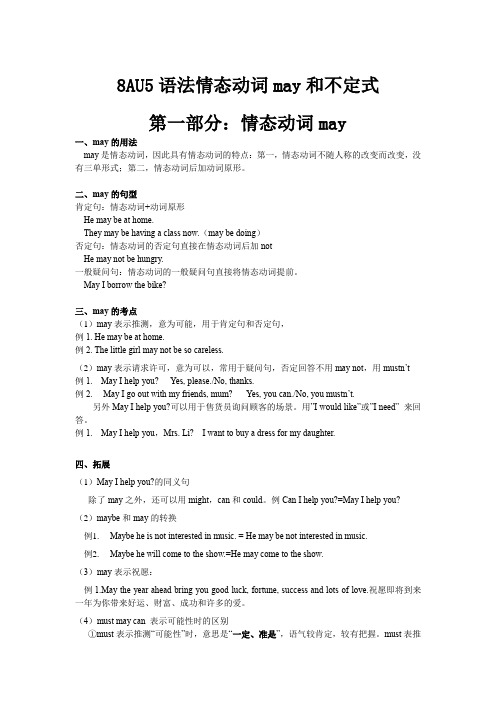
8AU5语法情态动词may和不定式第一部分:情态动词may一、may的用法may是情态动词,因此具有情态动词的特点:第一,情态动词不随人称的改变而改变,没有三单形式;第二,情态动词后加动词原形。
二、may的句型肯定句:情态动词+动词原形He may be at home.They may be having a class now.(may be doing)否定句:情态动词的否定句直接在情态动词后加notHe may not be hungry.一般疑问句:情态动词的一般疑问句直接将情态动词提前。
May I borrow the bike?三、may的考点(1)may表示推测,意为可能,用于肯定句和否定句,例1. He may be at home.例2. The little girl may not be so careless.(2)may表示请求许可,意为可以,常用于疑问句,否定回答不用may not,用mustn’t例1.---May I help you?----Yes, please./No, thanks.例2. ---May I go out with my friends, mum? ----Yes, you can./No, you mustn’t.另外May I help you?可以用于售货员询问顾客的场景。
用”I would like”或”I need” 来回答。
例1.---May I help you,Mrs. Li?---I want to buy a dress for my daughter.四、拓展(1)May I help you?的同义句除了may之外,还可以用might,can和could。
例Can I help you?=May I help you?(2)maybe和may的转换例1.Maybe he is not interested in music. = He may be not interested in music.例2.Maybe he will come to the show.=He may come to the show.(3)may表示祝愿:例1.May the year ahead bring you good luck, fortune, success and lots of love.祝愿即将到来一年为你带来好运、财富、成功和许多的爱。
八年级上册英语unit5全单元
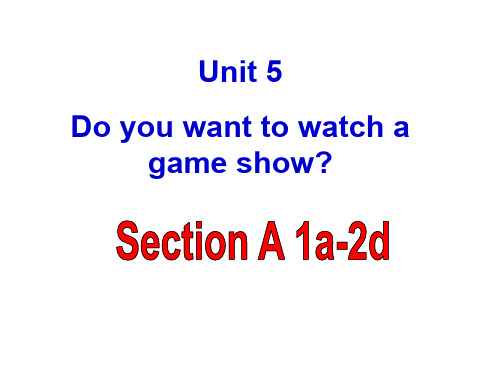
Evening News晚间新闻Spor Nhomakorabeas News
体育新闻
Tell it like it is
实话实说
World’s Report
世界报道
Weather Report
天气预报
Dialogue
Around the World
Law today
Man and Nature
时尚节目
中央电视台新闻 晚间新闻 世界报道 天气预报 体育新闻 实话实说 连续剧 人与自然 情景喜剧
CCTV News Evening News World’s Report Weather Report Sports News Tell it like it is Soap Opera Man and Nature Sitcom
Unit 5
Do you want to watch a game show?
Survey: Do you like watching TV? Do you want to watch a game show?
What are these TV shows?
game show
CCTV News
Talk about preferences; Make plans
1a Match the TV shows with the pictures [a-g]. 1.talk show__e__ 2.soap opera__d__ 3.sports show__b__ 4. sitcom __c_____ 5.game show__a___ 6.talent show__g___ 7.news ____f ____
every night. A: Why? B: Because I hope to find out what’s going on
仁爱版英语八年级U5T2知识点

仁爱版英语八年级U5T2知识点在仁爱版英语八年级的Unit 5中,第二个Task包含了一些重要的英语知识点。
以下是这一部分知识点的详细介绍。
1. 一般过去时一般过去时指过去某个时间做的动作或存在的状态。
构成方式为动词过去式。
例如:I studied for three hours yesterday.(我昨天学习了三个小时)They played soccer in the park last weekend.(他们上个周末在公园里踢足球)2. 时间状语时间状语用于表示动作发生的时间。
常见的时间状语有:yesterday(昨天)、last week(上个星期)、at 5 o'clock(在五点钟)、in 1999(在1999年)等。
例如:I met my old friend yesterday.(我昨天见到了我的老朋友)She didn't go to school last Monday.(她上个星期一没有去上学)3. 接替代词接替代词用于代替前面提到的名词,以避免重复。
常见的接替代词有:it(它)、them(它们)、him(他)、her(她)等。
例如:I saw a movie yesterday. It was very interesting.(我昨天看了一部电影,很有趣)Tom and Jack played basketball yesterday. Jack beat him.(汤姆和杰克昨天打篮球,杰克打败了他)4. 常用短语常用短语是指日常生活中经常使用的词组。
八年级的Unit 5T2中介绍了一些常用的短语,例如:go to the cinema(去电影院)have a great time(过得很愉快)get on well(相处融洽)be fond of(喜欢)be interested in(对…感兴趣)以上就是八年级英语Unit 5T2的知识点介绍。
通过学习这些知识点,我们能够更好地掌握英语的日常表达,提高自己的语言能力。
仁爱版八年级英语u5t3知识点

仁爱版八年级英语u5t3知识点Unit 5, Topic 3是仁爱版八年级英语课程中非常重要的一个话题,本文将会对该知识点进行详细介绍。
在这一话题中,我们将会学习到购物和比较的一些基础词汇和常用句子,同时也会介绍一些常见的购物场景和相关文化背景知识。
一、词汇1.购物(Shopping)shopping center(购物中心),shop(商店),department store (百货公司),market(市场),mall(购物中心),store(商店),supermarket(超市),boutique(精品店),grocery store (杂货店),pharmacy(药房),jewelry store(珠宝店)2.物品与价格(Items and Prices)price(价格),discount(打折),sale(特价),coupons(优惠券),cash(现金),credit card(信用卡),debit card(借记卡),wallet(钱包),receipt(收据),change(零钱),bill(货单)3.大小与颜色(Size and Color)size(尺寸),small(小号),medium(中号),large(大号),extra large(超大号),color(颜色),red(红色),yellow(黄色),orange(橙色),green(绿色),blue(蓝色),purple(紫色),pink(粉色),black(黑色),white(白色),gray(灰色)4.问路和交通(Asking Directions and Transportation)directions(方向),left(左边),right(右边),go straight (直走),turn(转弯),intersection(十字路口),traffic light (红绿灯),bus(公交车),subway(地铁),taxi(出租车)二、常用句子1.购物相关(Shopping)Can I help you?(我能帮您吗?)What can I do for you?(我能为您做什么?)How much is this?(这个多少钱?)Can you give me a discount?(你能便宜点吗?)I’d like to return this.(我想退货。
八年级上册英语u5课本习题答案
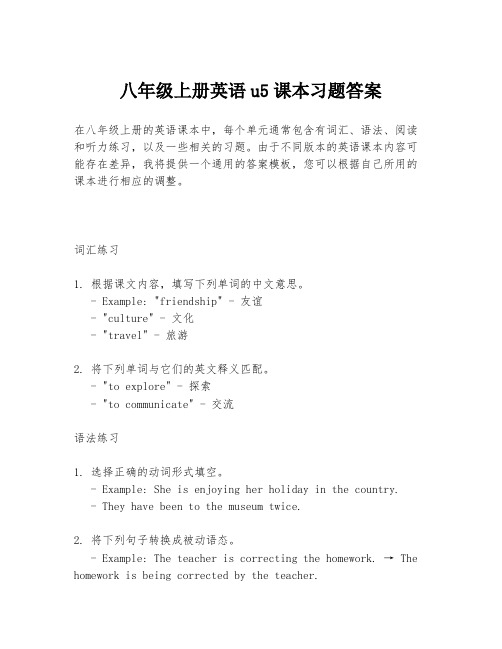
八年级上册英语u5课本习题答案在八年级上册的英语课本中,每个单元通常包含有词汇、语法、阅读和听力练习,以及一些相关的习题。
由于不同版本的英语课本内容可能存在差异,我将提供一个通用的答案模板,您可以根据自己所用的课本进行相应的调整。
词汇练习1. 根据课文内容,填写下列单词的中文意思。
- Example: "friendship" - 友谊- "culture" - 文化- "travel" - 旅游2. 将下列单词与它们的英文释义匹配。
- "to explore" - 探索- "to communicate" - 交流语法练习1. 选择正确的动词形式填空。
- Example: She is enjoying her holiday in the country.- They have been to the museum twice.2. 将下列句子转换成被动语态。
- Example: The teacher is correcting the homework. → The homework is being corrected by the teacher.阅读理解1. 阅读课文并回答以下问题。
- What is the main idea of the text?- The main idea is that...2. 判断下列句子是否正确,正确的写"T",错误的写"F"。
- The author suggests that we should learn a new language. (T/F)听力练习1. 听录音并完成下列填空。
- The speaker talks about the importance of...2. 根据听力内容,选择正确答案。
冀教版八年级英语Unit5知识点汇总

冀教版八年级英语Unit5知识点汇总1. hope to do sth. 希望做某事2. be easy/ hard to do sth. 做某事容易/ 很难.3. no matter wha t/who/ when/ where/ how 无论什么/谁/何时/何地/怎样4. tell sb to do sth:告诉某人做某事5. have a headache 头疼6. be sure:对...有把握for sure 肯定地;确实be sure that + 从句确信……be sure of sb./ sth. 对某事/某人有把握be sure to do 一定/必然做…7. when I am a man = when I'm older = when I grow up当我长大后8. be nice to sb. = be good to sb. = be kind to sb. 对某人好(善待某人)9. be sick = be ill 不舒服;生病10. some advice一些建议a piece of advice 一条意见give advice 提出忠告take one's advice 接受忠告give advice to sb. = give sb. advice给某人提建议11. play with sth./sb. 拿某物来玩/与某人一起玩12. so/too many + 复数名词如此多/太多的某物so/too much + 不可数名词如此多/太多的某物13. in ten more years 再过十年14. the rich/ poor 有钱人/穷人the young/ old 年轻人 / 老年人15. It doesn't matter! 没关系!16. take small steps to do sth 采取小步骤17. write a letter to sb. = write sb. a letter = write to sb.给某人写信18. run a business 经营生意19. come true 实现20. stop sb. from doing sth. 阻止某人做某事21. be strict with sb. 对某人严格要求22. take the medicine 吃药23. have a good rest 好好休息24. lead a team 领导一个团队25. a fear of heights 恐高。
八年级英语 U5 Educational exchanges Vocabulary

He is glad to meet you. 他看见我们非常高兴。
He was glad to see us.
(2) guest 大厅里有很多宾客。
n. 客人;宾客
There are many guests in the hall.
(3) 可用来表示“家”的名词有house 和home。
house 一般表示供人居住的房屋等建筑物;
host mother 寄宿家庭妈妈
host brother 寄宿家庭兄弟
host sister
寄宿家庭姐妹
family 意为“家庭”,表示“家庭整体”这一 概念并作主语时,谓语动词用单数形式;表示 “家庭全体成员”时为集合名词,谓语动词用 复数形式。例如: 我家是一个大家庭。
My family is very large. 我家人今晚要一起吃晚饭。
The host is very friendly to us. 主人向我敬酒。
The host offered me a drink.
5. local
adj. 地方的;当地的
当地的食物很特别。
The local food is very special . 当地人非常的友好。
The local people are very friendly. 她的孩子们都在当地学校上学。 Her children go to the local school.
Mr Wang teaches us Maths.
11. The students spend the weekdays studying
with Chinese students. 这些学生平时和中国学生一起学习。 (1) spend意为“花(时间);度过”,常用 搭配是spend some time (in) doing sth, 意为 “花(时间)做某事”。如: 我花了两个小时读这个故事。
人教版英语八年级Unit5基础习题(含答案)

人教版英语八年级Unit5基础习题(含答案)Ⅰ. 单项选择1. What ________ good news! We are all excited.A. aB. anC. theD. /2. Do you mind ________ here?A. I smokingB. me smokeC. my smokingD. me to smoke3.—________ do you think of scary movies?—I love them.A. WhatB. HowC. WhereD. When4. Jack is always ________ to help people in trouble.A. readyB. busyC. ableD. helpful5. I went to the train station to ________ when the train would arrive.A. lookB. look forC. findD. find out6. This summer she doesn't plan ________ to London for her holiday.A. to goB. goingC. goD. goes7. When Tom retired from the company, Peter ________ his place.A. tookB. gotC. madeD. put8. Alice ________ his mother to buy a new dress for her.A. hopesB. expectsC. makesD. lets9.—________?—He was ill and didn't come to school yesterday.A. What did he happenB. What he happenedC. What happened to himD. When happened10.—Mom, I won the first prize in the singing competition.—________A. You're right.B. You're welcome.C. You did a good job!D. Thank you.Ⅱ. 完形填空There are five people in my family: my grandparents, my parents and __1__. We all likewatching TV. In the evening,we usually watch TV together. My grandparents like watching Beijing Opera. But I can't __2__ it. My father likes watching talk shows, __3__ my mother doesn't like them. She likes watching soap operas. She thinks they are very interesting, but we don't __4__ them, either.What do you think of sports shows? I like __5__ very much and I enjoy watching them __6__ my free time. But my grandparents think they are very __7__.What should we do? My father says that we will have __8__ TV set soon. My mother thinks it's a good idea, __9__. But I think if __10__ of us has a TV set,that will be wonderful.1. A. he B. she C. we D. I2. A. like B. mind C. stand D. know3. A. and B. but C. so D. or4. A. dislike B. hate C. stand D. mind5. A. sports B. music C. dancing D. films6. A. in B. on C. for D. of7. A. interesting B. excitingC. boringD. fun8. A. other B. another C. the other D. others9. A. too B. also C. either D. yet10. A. all B. every C. one D. eachⅢ. 阅读理解ALast week I asked some students about their favorite movies and food. Some of their answers were very interesting. Here are their likes and dislikes.Rick, a thirteen-year-old boy, likes watching thrillers, and he likes eating hamburgers best. Lisa is eleven years old. She doesn't like thrillers. She likes action movies. She likes cabbage noodles. Victor is a big boy. He is fifteen years old. He doesn't like action movies. He likes documentaries. He thinks they are very interesting. His favorite food is chicken. Sally, a twelve-year-old English girl, likes comedies and she likes dumplings. She says dumplings are very delicious.BDo you remember the funny Popeye the sailor(水手)? He wears the sailor's uniform, takes a pipe(烟斗) in the mouth and loves to eat spinach(菠菜).Of all the famous cartoon characters, Popeye is at the top. It encourages lots of young peopleto eat spinach to become as strong as Popeye. Popeye the character first appeared in the newspaper in 1929. And in 1933 it appeared on the big screen. A survey in 1938 showed that Popeye was the most popular Hollywood cartoon character. Almost everyone loves this super hero. Kids love him because he is strong. Young people love him because he loves his girlfriend Olive. For old people, Popeye is a brave and kind man, and he always helps the poor people.6. What is Popeye like?A. He is tall.B. He loves eating.C. He is funny.D. He always works.7. What does the un derlined word “encourages” mean in Chinese?A. 请求B. 强迫C. 鼓吹D. 鼓励8. When did Popeye the character first appear?A. In 1929.B. In 1933.C. In 1938.D. In 1939.9. Why do old people love Popeye?A. Because he is strong.B. Because he loves his girlfriend.C. Because he is a sailor.D. Because he is kind and brave.10. Which of the following is TRUE?A. Popeye first appeared in a movie.B. Popeye works at sea.C. Popeye is the strongest cartoon character.D. Popeye always helps young people.Ⅳ. 用所给词的适当形式填空1. We don't like this TV show because it's ________(meaning).2. Soap operas are ________(enjoy). I'd like to follow the story and see what will happen next.3. Lin Dan is very ________(success) as a player.4. Children should watch more ________(education) programs.5. I hope ________(talk) with you about your study.Ⅴ. 完成句子(每小题2分,共10分)1.我弟弟喜欢装扮成超人。
人教版八年级上册英语Unit5知识点总结
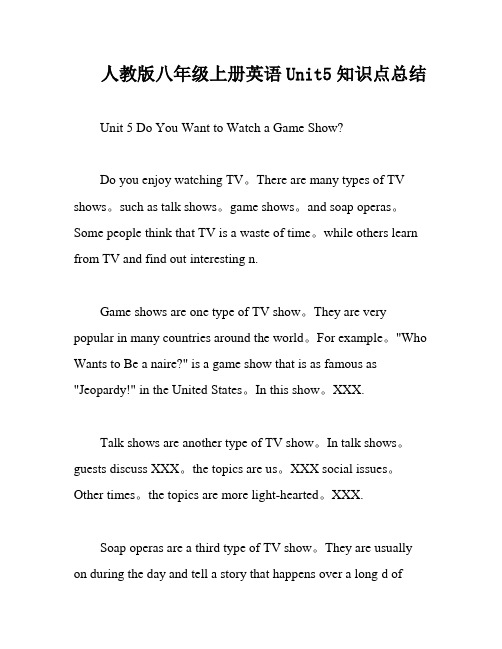
人教版八年级上册英语Unit5知识点总结Unit 5 Do You Want to Watch a Game Show?Do you enjoy watching TV。
There are many types of TV shows。
such as talk shows。
game shows。
and soap operas。
Some people think that TV is a waste of time。
while others learn from TV and find out interesting n.Game shows are one type of TV show。
They are very popular in many countries around the world。
For example。
"Who Wants to Be a naire?" is a game show that is as famous as "Jeopardy!" in the United States。
In this show。
XXX.Talk shows are another type of TV show。
In talk shows。
guests discuss XXX。
the topics are us。
XXX social issues。
Other times。
the topics are more light-hearted。
XXX.Soap operas are a third type of TV show。
They are usually on during the day and tell a story that happens over a long d oftime。
The characters in soap operas often dress up and have XXX love watching soap operas。
PEP人教版英语八年级上册-Unit-5--Section-B-
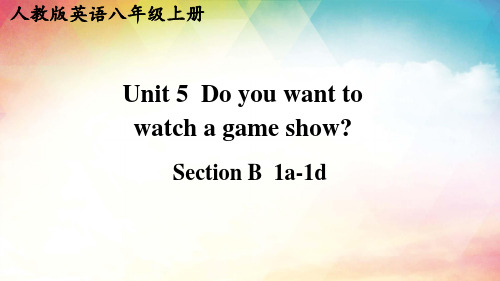
Listen again and pay attention to the description words.
John: What do you want to do today, Mary?
Mary: I want to watch a movie. Are there any good
John wants to watch … because they’re … I like to watch … because they’re …
Mary wants to watch talk shows because they’re wonderful. I like to watch scary movies because they’re exciting.
Unit 5 Do you want to watch a game show?
Section B 2a-2e
Learning objects (学习目标)
By the end of the class, you will be able to …
1. Understand detailed information about Mickey in the text;
wonderful enjoyable
1c Listen again. Write down the words John and
Mary use to describe the TV shows or movies.
Action movies Scary movies Game shows
Sitcoms Talk shows
4. Why doesn’t John like a game show or a sitcom? Because he thinks they are boring.
八年级上英语译林版u5知识点

八年级上英语译林版u5知识点英语译林版第五单元是一个非常重要的单元,其中包含了许多值得学习的知识点。
在这篇文章中,我们将会介绍英语译林版八年级上册的第五单元的知识点,让我们一起来看看吧。
一、单词在这个单元中,我们学习了很多新的单词,包括常见的动物、食物、喜欢与不喜欢的表达方式等。
同时,我们也学习了有关音乐和博物馆的单词。
这些单词可以帮助我们更好地了解我们的周围世界,也可以让我们更好地进行交流。
二、短语在这个单元中,我们还学习了很多新的短语,比如介绍自己、询问别人的职业、表达自己喜欢和不喜欢的事情等。
这些短语在日常生活中是非常实用的,可以帮助我们更好地交流和表达自己的想法。
三、语法在这个单元中,我们学习了很多新的语法知识,其中最重要的就是现在进行时。
现在进行时是表示正在进行的动作或状态的时态,它可以让我们更加生动地描述正在发生的事情。
同时,我们还学习了一般现在时、一般过去时和一般将来时等时态,这些时态可以帮助我们更好地描述过去、现在和将来的事情。
四、阅读理解在这个单元中,我们还学习了很多有趣的阅读材料,包括关于美食、音乐和自然保护的文章。
通过阅读这些材料,我们不仅可以扩展自己的知识面,还可以提高自己的阅读理解能力。
五、写作能力在这个单元中,我们也进行了一些写作训练。
我们学习了如何写一封邀请信、如何写一篇关于博物馆的文章等。
这些写作训练可以帮助我们更好地理解英语,并提高我们的写作能力。
总之,英语译林版八年级上册的第五单元是一个非常重要的单元,其中包含了大量实用的知识点。
通过学习这些知识点,我们可以更好地掌握英语,并在日常生活中更好地应用英语。
人教版八年级下册英语Unit5知识点总结

人教版八年级下册英语Unit5知识点总结一、语法知识点A部分知识点1.过去进行时❶ 去进行时的构成及用法过去进行时由“助动词(was/were)+动词-ing”构成,表示在过去某一时刻或某一时间段正在进行的动作。
这一特定的过去时间除有上下文暗示以外,一般用过去的时间状语来表示。
如:then, at that time, at this time yesterday, at 10:00 yesterday morning, all right以及when/while从句等。
❶ 表示过去时间点正在进行的动作。
此时常伴明确的过去时间点等。
eg:She was reading a book at this time yesterday.昨天这个时候她正在看书。
(过去时间点正在进行的动作)I was watching TV then. 那时我正在看电视。
(过去时间点正在进行的动作)❶ 表示过去的某个阶段持续的动作。
eg:She was watching TV when the phone rang.(过去一段时间内持续的动作)她正在看电视,这时电话铃响了。
❶ 表示这一阶段反复发生的动作,带有褒贬感情色彩。
此时常伴有频度副词always等。
eg:The girl was always changing her mind.(过去反复发生的动作,带有感情色彩)这个女孩老是改变主意。
❶ 表示过去动作延迟到以后发生,即用过去进行表过去将来,此类动词是一些位置的变化的词。
eg:He told me that he was going soon.(过去进行表将来)他告诉我他很快就要走了。
❶ 过去进行时的一般疑问句句型:Be(Was/Were)+主语+现在分词+其他?肯定回答:Yes,主语+be(was/were).否定回答:No,主语+be(was/were) not.eg:--Were you cooking at that time? 那时,你在做饭吗?--Yes, I were.是的。
八年级英语下册unit5的单词

八年级英语下册unit5的单词rainstorm [ˈreɪnstɔ:m] n. 暴风雨alarm [əˈlɑ:m] n. 闹钟go off (闹钟)发出响声begin [bɪˈgɪn] v. 开始heavily [ˈhevɪli] adv. 在很大程度上,大量地suddenly [ˈsʌdənli] adv. 突然地pick up(=pick up the phone) 接电话strange [streɪndʒ] adj. 奇怪的,陌生的,奇特的storm [stɔ:m] n. 暴风雨wind [waɪnd] n. 风light [laɪt] n. & v. 电灯;点燃report [riˈpɔ:t] v. 报导,报告area ['eərɪə] n. 范围,地域,地区wood [wʊd] n. 树木,木材,树木window [ˈwindəu] n. 窗户flashlight ['flæʃlaɪt] n. 手电筒,火炬match [mætʃ] n. 火柴,比赛beat [bi:t] v. 敲打,打败against [əˈgenst] prep. 反对,对…不利asleep [əˈsli:p] adj. 睡着的,熟睡的fall asleep 进入梦乡,睡着die down 逐渐变弱,逐渐消失rise [raɪz] v. 上升,升起fallen [ˈfɔ:lən] adj. 倒下的,落下的apart [əˈpɑ:t] adv. 分离,分开have a look 看一看icy [ˈaɪsɪ] adj. 覆盖着冰的,冰冷的kid [kɪd] n. & v. (口语)小孩;开玩笑,欺骗realize [ˈri:əlaɪz] v. 认识到,了解make one's way 前往,费力地前进passage [ˈpæsɪdʒ] n. 章节,段落pupil [ˈpju:pl] n. 学生completely [kəmˈpli:tli] adv. 彻底地,完全地shocked [ʃɔkt] adj. 震惊的,震撼的silence [ˈsaɪləns] n. 寂静,沉默in silence 沉默,无声recently [ˈri:sntli] adv. 不久前,近来,最近take down 拆除,往下拽,记录terrorist [ˈterərɪst] n. 恐怖分子date [deɪt] n. 日期,日子tower [ˈtaʊə(r)] n. 塔at first 首先,最初truth [tru:θ] n. 真相,真理,事实1.make sure 确信;确认2.beat against... 拍打……3. fall asleep 进人梦乡;睡着4. die down 逐渐变弱;逐渐消失5. wake up 醒来6. in a mess 一团糟7. break...apart 使……分离8. in times of difficulty 在困难的时候9. at the time of 当.......时候10. go off (闹钟)发出响声11. take a hot shower 洗热水澡12. miss the bus 错过公交车13. pick up 接电话14. bring... together 使……靠拢15. in the area 在这个地区16. miss the event 错过这个事件17. by the side of the road 在路边18. the Animal Helpline 动物保护热线19. walk by 走路经过20. make one’s way to.... 在某人去……的路上21. hear the news 听到这个消息22.important events in history 历史上的重大事件23.for example 例如24.be killed 被杀害25. over 50 50多(岁)26. a school pupil 一个小学生27. on the radio 通过广播28.in silence 沉默;无声29.more recently 最近地;新近30.the World Trade Center 世贸中心31.take down 拆除;摧毁32.have meaning to 对……有意义33.remember doing sth. 记得做过某事34.at first 首先;最初。
八年级上册英语unit5
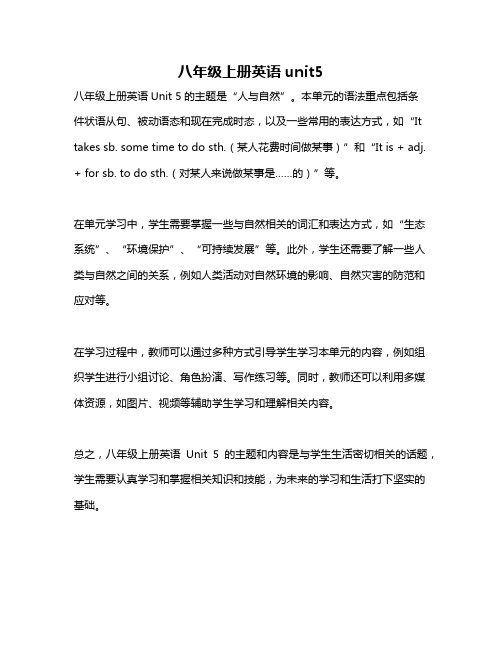
八年级上册英语unit5
八年级上册英语Unit 5的主题是“人与自然”。
本单元的语法重点包括条
件状语从句、被动语态和现在完成时态,以及一些常用的表达方式,如“It takes sb. some time to do sth.(某人花费时间做某事)”和“It is + adj. + for sb. to do sth.(对某人来说做某事是……的)”等。
在单元学习中,学生需要掌握一些与自然相关的词汇和表达方式,如“生态系统”、“环境保护”、“可持续发展”等。
此外,学生还需要了解一些人类与自然之间的关系,例如人类活动对自然环境的影响、自然灾害的防范和应对等。
在学习过程中,教师可以通过多种方式引导学生学习本单元的内容,例如组织学生进行小组讨论、角色扮演、写作练习等。
同时,教师还可以利用多媒体资源,如图片、视频等辅助学生学习和理解相关内容。
总之,八年级上册英语Unit 5的主题和内容是与学生生活密切相关的话题,学生需要认真学习和掌握相关知识和技能,为未来的学习和生活打下坚实的基础。
人教版八年级英语上册Unit5知识点精讲
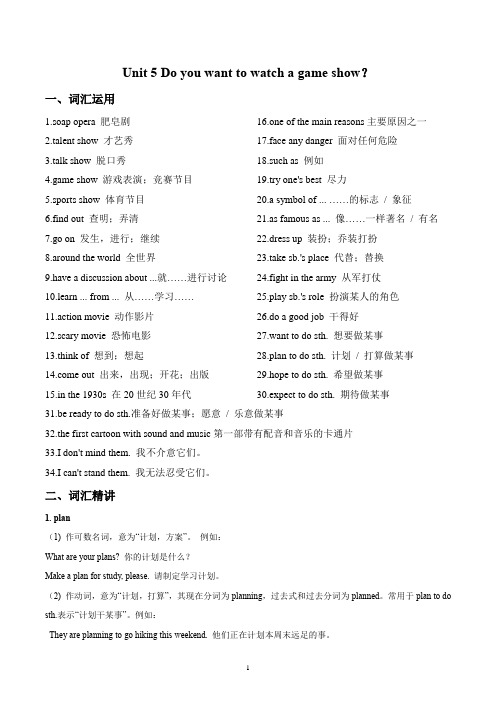
Unit 5 Do you want to watch a game show?一、词汇运用1.soap opera 肥皂剧2.talent show 才艺秀3.talk show 脱口秀4.game show 游戏表演;竞赛节目5.sports show 体育节目6.find out 查明;弄清7.go on 发生,进行;继续8.around the world 全世界9.have a discussion about ...就……进行讨论10.learn ... from ... 从……学习……11.action movie 动作影片12.scary movie 恐怖电影13.think of 想到;想起e out 出来,出现;开花;出版15.in the 1930s 在20世纪30年代16.one of the main reasons主要原因之一17.face any danger 面对任何危险18.such as 例如19.try one's best 尽力20.a symbol of ... ……的标志/ 象征21.as famous as ... 像……一样著名/ 有名22.dress up 装扮;乔装打扮23.take sb.'s place 代替;替换24.fight in the army 从军打仗25.play sb.'s role 扮演某人的角色26.do a good job 干得好27.want to do sth. 想要做某事28.plan to do sth. 计划/ 打算做某事29.hope to do sth. 希望做某事30.expect to do sth. 期待做某事31.be ready to do sth.准备好做某事;愿意/ 乐意做某事32.the first cartoon with sound and music第一部带有配音和音乐的卡通片33.I don't mind them. 我不介意它们。
人教版八年级上册英语Unit5 重点词组
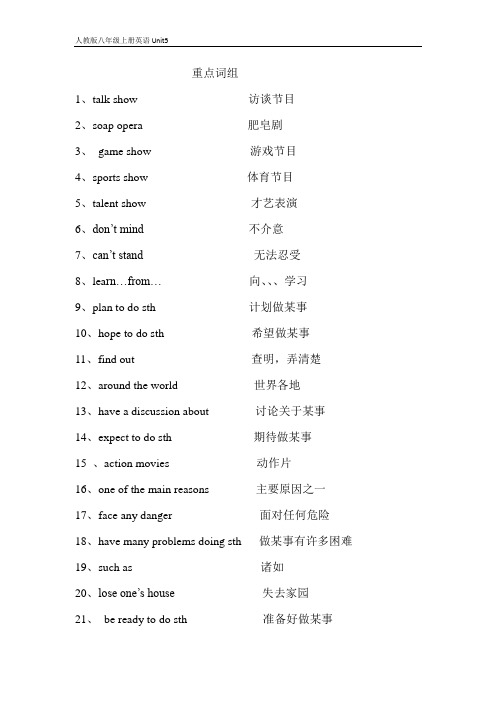
重点词组
1、talk show 访谈节目
2、soap opera 肥皂剧
3、game show 游戏节目
4、sports show 体育节目
5、talent show 才艺表演
6、don’t mind 不介意
7、can’t stand 无法忍受
8、lea rn…from… 向、、、学习
9、plan to do sth 计划做某事
10、hope to do sth 希望做某事
11、find out 查明,弄清楚
12、around the world 世界各地
13、have a discussion about 讨论关于某事
14、expect to do sth 期待做某事
15 、action movies 动作片
16、one of the main reasons 主要原因之一
17、face any danger 面对任何危险
18、have many problems doing sth 做某事有许多困难
19、such as 诸如
20、lose one’s house 失去家园
21、be ready to do sth 准备好做某事
22、see sb do sth 看见某人做某事(经常或做某事的全过程)
23.see sb doing sth 看见某人正在做某事
24.a pair of … 一双…/一对…。
八年级人教版英语u5知识点

八年级人教版英语u5知识点Unit 5词汇:1. edition n.版本;版次2. achieve v.达到,实现3. concentrate v.集中,全神贯注4. purpose n.目的,意图5. measure v.测量6. furniture n.家具7. block n.街区8. rent n.租金9. slightly adv.轻微地,稍微10. expect v.期望,预期11. culture n.文化12. entire adj.全部的,整个的13. invest v.投资14. feature n.特征,特色15. equal adj.相等的,平等的Unit 5语法:1. 一般过去时态一般过去时态是描述过去发生的事情,叙述的是“过去的事情”。
“一般过去时”无需判断所述事件是完成了还是正在进行(一般将其和过去延续性动作区分),仅仅是强调事情是发生在过去的。
如:I studied Chinese two years ago. (我两年前学过中文。
)He was at home yesterday afternoon. (昨天下午他在家里。
)2. 特殊疑问句特殊疑问句是指以特殊疑问词开头,句子以问号结尾的句子。
其特点是:疑问词起到具体化和限制的作用,一般具有7个基本疑问词:who (谁), what (什么), when (什么时候), where (哪里), why (为什么), how (怎么), how many (多少) 。
如:What book did you buy? (你买了什么书?)Where did you go last weekend? (上个周末你去哪里了?)Who is your best friend? (你最好的朋友是谁?)3. 现在完成时态现在完成时态采用“have / has + 过去分词”的结构。
现在完成时反映目前的状态的来源是过去发生的事情。
人教版英语八年级上册Unit5单词+课文+知识梳理

人教版英语八年级上册Unit5单词音频+课文音频+知识梳理sitcom ['sɪtkɒm] n.情景喜剧 (= situation comedy) news [njuːz] n.新闻;消息soap [səʊp] n.肥皂;肥皂剧educational [ˌedʒu'keɪʃənl] adj.教育的;有教育意义的plan [plæn] n.计划;方法v.打算;计划hope [həʊp] .希望;期望;盼望n.希望discussion [dɪ'skʌʃn] n.讨论;谈论stand [stænd] v.站立;忍受happen ['hæpən] vi.发生;碰巧;出现;偶遇may [meɪ] aux.可以,能够;可能,也许expect [ɪk'spekt] v.预期;期待;盼望joke [dʒəʊk] n.笑话;玩笑v.说笑话;开玩笑comedy ['kɒmədi] n.喜剧;滑稽;幽默事件find out 查明;弄清meaningless ['miːnɪŋləs] adj.无意义的;不重要的action ['ækʃn] n.行为;活动cartoon [kɑː'tuːn] n.卡通;漫画culture ['kʌltʃə(r)] n.栽培;文化;教养famous ['feɪməs] adj.著名的;有名的appear [ə'pɪə(r)] vi.出现;出版;显得become [bɪ'kʌm] v.变成;成为rich [rɪtʃ] adj.富有的;富饶的;丰富的successful [sək'sesfl] adj.成功的;圆满的might [maɪt] aux.可能;也许;may的过去式main [meɪn] adj.主要的;最重要的reason ['riːzn] n.原因;理由film [fɪlm] n.电影unlucky [ʌn'lʌki] adj.倒霉的;不幸的;不吉利的lose [luːz] vt.丢失;失败vi.失败ready ['redi] adj.准备好的;乐意的character ['kærəktə(r)] n.个性;品质;人物;simple ['sɪmpl] adj.简单的;朴素的;单纯的;笨的army ['ɑːmi] n.军队;陆军;一大批action movie 动作片be ready to 愿意迅速做某事dress up 装扮;乔装打扮take sb.’s place 代替;替换do a good job 工作干得好;做得好Sarah 萨拉(女名)Walt Disney 沃尔特.迪斯尼Minnie 明妮(女名)Mickey Mouse 米老鼠Steamboat Willie 迪士尼公司制作的全球第一部有声动画片《威利号汽船》Hollywood 好莱坞,美国电影业the Hollywood Walk of Fame 好莱坞星光大道(美国)【重点短语】1. find out 查出/发现2. be ready to do 准备做…3. dress up 打扮/化妆成4. take one's place 代替某人5. do a good job 干的好/表演的出色6. think of 想到/思考7. game show 游戏节目8. learn from 向…...学习9. talk show 访谈节目10. soap opera 肥皂剧11. go on 继续12. watch a movie 看电影13. one of… 其中之一14. try one’s best to =do one’s best to 竭尽全力15. a pair of 一双16. as famous as 一样闻名/出名17. look like 看起来像18. around the world 世界各地19. have a discussion about 讨论…...20. one day 有一天/某一天21. such as 例如22. a symbol of 一个象征/标志23. something enjoyable 快乐的事情24. interesting information 有趣的信息【重点句型】1. Some people might ask how this cartoon animal became so popular.有些人可能会问这个卡通动物怎样变得如此受欢迎了呢。
- 1、下载文档前请自行甄别文档内容的完整性,平台不提供额外的编辑、内容补充、找答案等附加服务。
- 2、"仅部分预览"的文档,不可在线预览部分如存在完整性等问题,可反馈申请退款(可完整预览的文档不适用该条件!)。
- 3、如文档侵犯您的权益,请联系客服反馈,我们会尽快为您处理(人工客服工作时间:9:00-18:30)。
扬中市第一中学八年级英语练习(五)(一)选择题:( )1.-Did you go to the party yesterday? -Yes. It was __ fun evening. We all had ____ great fun at the party. A. a; / B. a; a C./;/ D./: the( )2. They had to operate _______his arm because it was broken in two places.A. withB. /C. atD. on( )3. -How about the pollution in the countryside? -Luckily, it's not as serious as _______ in the big cities. A. that B. it C. one D. those( )4. -Why does the river smell terrible? -Because the water_______.A. was pollutedB. has been pollutedC. will be pollutedD. has polluted ( )5. —When did you get to know the information? —____ I ____ yesterday.A. Until, toldB. Not until, toldC. Until, was toldD. Not until, was told( )6. You _______have a wrong number. There's no Mr Johnson here.A. needB. wouldC. mustD. can( )7. -Are people around you used to _____things online? -Yes. It's much easier, and also cheaper. A. order B. orders C. ordered D. ordering ( )8. -So many things ____ you! Where are you going? -I'm going ______ a trip to Tibet.A. for; toB. with; onC. to; onD. with; for ( )9.-Will's alr eady back from the charity walk, __ he'?-______. Now he's taking a rest in the next room. A. hasn't; Yes B. has; No C. isn't; Yes D. is he; No ( )10. —How ____ it is to see you again! —Me, too.A. happyB. pleasedC. gladD. pleasant ( )11. —Why does Kate look so __ ?—Because her father was hit when he went to work .A. happy, by carB. unhappy, by carC. happy, by a carD. unhappy, by a car ( )12. China is _________ the first countries that sent their spaceships into space.A. ofB. betweenC. amongD. with(二)用括号内所给动词的适当形式填空。
1.The police _______________(search) the whole building for the thief at present. But I don’t think they ____________ (find) him.2. If you_____________ (not be) careless, I am afraid you ____________(win) the game.3.The Greens _____ (watch) a film in the cinema when someone _______(break) into their house.4. Every visitor should know that no photos can______________ (take) in the museum.5. Mr. Wang______________ (teach) in this school since he began to work here in 1998.6. What an amazing thing it is___________ (travel) around the world in eight hours!7. Many famous pop stars______________ (invite) to the charity show this weekend.8. It’s too hot in the room. Do you mind______________ (open) the windows?9. Look! How heavily it ____________ (rain)! We had better ______________(not go) out today.10. Many young teachers___________ (send) to work in the poor areas every year.11. Now, microblog (微博) makes it easier for people _______________( share) their lives. (三)句型转换:1.In the past people thought the earth was flat./People _____ _____ the earth was flat.2.The family didn't have enough money to send her abroad.The family __________ __________ ____________ __________ her abroad.3.There were about fifteen people in the room, and most of them were women.There were about fifteen people in the room, _______ women.4.Do you mind if I sit here? Do you mind ___ ______ here?5.When will the charity show take place?/ When will the charity show ___ __ ?6. He was not tall enough to reach the apples on the tree.He was ________ _________ __________ reach the apples on the tree.He was ___ __ ___________ he _____ reach the apples on the tree.He was ________ ________ a ________ _______ he ________ reach the apples on the tree. He was _______ a ________ ________ ________ he _______ reach the apples on the tree.(四)完形填空I cannot believe that it is already 2014! Where did 2013 go? I guess the saying is true: Time flies when you are having 1 . I am going back to the USA soon, but I can’t 2 my good friends in Nanjing. One of my favourite 3 of 2013 in Nanjing was going boating in Xuanwu Lake Park with my friends. We usually did this during the summer months 4 it’s warm, sunny and you don’t need to wear thick coats or long jeans like you do in the winter time. My friends and I would usually 5 at Xuanwu Gate at 8:00 am on Sundays. We would often play for 6 and then walk over to the bus station to take a bus to The Confucius Temple. When we got there, my favourite thing 7 was the Chinese food, such as rice dumplings, smelly tofu and so on.Even though I love summer, winter has so many fun things to do, too. 8 I love most about winter time are the Christmas Trees in Xinjiekou. People 9 the trees with many shiny lights and they were so beautiful and lovely. And I also got to meet a young man who 10 up as Father Christmas around the trees. He was giving out presents or colourful boxes full of sweets. Good bye, my Chinese friends. Happy Spring Festival!( )1.A.lessons B. meals C. fun D. money( )2.A.remember B. forget C. record D. change( )3.A.friends B. movies C. memories D. jokes( )4.A.because B. so C. if D. after( )5.A.attend B. discuss C. get D. meet( )6.A.days B. years C. months D. hours( )7.A.to eat B. to drink C. to see D. to play( )8.A.When B. What C. Where D. Why( )9.A.painted B. repaired C. kept D. decorated( )10.A.put B. filled C. dressed D. chose(五).句型转换:根据各题后括号内的要求完成下列句子。
